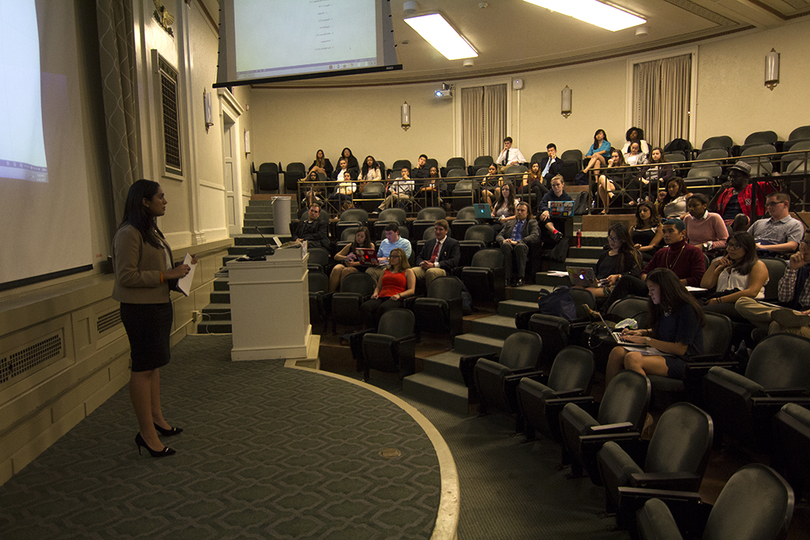Student Association working with administrators to publish syllabi before class registration

If the Student Association is able to pass a resolution on the syllabi initiative, students would be able to access syllabi through MySlice before they have to choose their classes. Chase Guttman | Assistant Photo Editor
UPDATED: Oct. 5, 2015 at 4:15 p.m.
The Student Association is taking steps to make syllabi available to students prior to class registration.
The organization posted a survey to its Facebook page requesting student feedback on the initiative, and SA’s Academic Affairs Chair Sonia Suchak will be meeting with Syracuse University administrators Monday to discuss the possibility of students seeing syllabi before class registration.
So far, students of varying majors and years have filled out the survey, Suchak said. Suchak and SA President Aysha Seedat said the purpose of the survey is to garner that kind of student support, so they could use it in pushing the initiative.
“When we talk to administrators, we need to show them ample evidence,” Seedat said.
Suchak will meet Monday morning with Associate Dean of Advising Kandice Salomone, Associate Provost of Academic Programs Andria Costello Staniec and College of Arts and Sciences Dean Karin Ruhlandt.
“I think that providing students with access to a syllabus prior to registering for class helps to inform them of the content of their class,” said Costello Staniec. “That, in turn, helps students choose courses that are in line with their career goals.”
She added that one of the current problems is that it’s not always known during the registration period who the professor for a certain course will be and “thus, even if access to a syllabus was given, it could change by the time classes started.”
Suchak’s primary concern is ensuring that students can be aware of textbook costs before deciding to take a course. She called the current system unfair to students.
“You take a class and you pay $130 for a textbook, but you didn’t know you had to pay it (before registering),” she said.
Suchak said she also wants to give students a chance to evaluate the time commitment a class will require before registering for it, since some students might want to scale back their workload in a given semester.
Seedat said if students had this information readily available to them when they register, it would reduce the number of courses that get dropped in the first two weeks of classes.
“They wouldn’t be blindsided,” she said. “… They wouldn’t have to wait until the school year and then start moving classes around.”
A resolution for the initiative has not yet been drafted, and Seedat said doing so would be up to Suchak. If one were to be drafted and passed, students would be able to access syllabi through MySlice before they have to choose their classes.
In enforcing the policy, Suchak said the most difficult thing for SA would be requiring professors to have their syllabi in on time.
“I know many of them are weary about it,” she said.
The idea to make syllabi available before registering for classes isn’t new to SA; it’s an initiative that has been on the table for a few years, Seedat said. Just last year, for example, then-president Boris Gresely worked on a similar project but didn’t get far with it, Suchak said.
But after looking into the policies of other universities over the summer, Suchak said she decided this was something SU needed, and so she has been working on the initiative since.
Both Seedat and Suchak are policy studies majors, and the syllabus for every public affairs course is available online for students to look over before registering for the class. Seedat said it’s something that’s helped her over the years and she wants students in all majors to have that same opportunity.
“I know that it could really help students,” she said.




